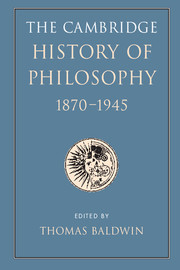Book contents
- Frontmatter
- Contents
- List of contributors
- Introduction
- I 1870–1914
- 1 Positivism, Idealism, and Pragmatism
- 2 Psychology and Philosophy
- 3 Logic, mathematics, and judgement
- 4 Philosophy and the new physics
- 13 The atomism debate
- 14 Theories of space-time in modern physics
- 5 The idea of social science
- 6 Ethics, politics, and legal theory
- 7 Philosophy of religion and art
- Interlude
- II 1914–1945
- Biobibliographical appendix
- Bibliography
- INDEX
- References
13 - The atomism debate
from 4 - Philosophy and the new physics
Published online by Cambridge University Press: 28 March 2008
- Frontmatter
- Contents
- List of contributors
- Introduction
- I 1870–1914
- 1 Positivism, Idealism, and Pragmatism
- 2 Psychology and Philosophy
- 3 Logic, mathematics, and judgement
- 4 Philosophy and the new physics
- 13 The atomism debate
- 14 Theories of space-time in modern physics
- 5 The idea of social science
- 6 Ethics, politics, and legal theory
- 7 Philosophy of religion and art
- Interlude
- II 1914–1945
- Biobibliographical appendix
- Bibliography
- INDEX
- References
Summary
INTRODUCTION
The Greeks put forward atomism in response to a philosophical problem: that of reconciling the Parmenidean thesis of the immutability of Being with the undeniable existence of phenomenal change. Democritus postulated a void containing a plurality of indivisible and immutable particles called atoms. The flux of appearances was to be explained in terms of different configurations of the same particles within the same empty space. Thus the only change admitted by the atomists was that of spatial position with respect to time. Through the work of chemists like Boyle and Dalton, atomism was gradually transformed into a testable theory. It proved to be a remarkably successful explanatory conjecture.
In the nineteenth century, atomism faced a serious challenge posed by a rival programme: phenomenological thermodynamics. The latter was based on two principles: those [A] of the conservation and [B] of the degradation of energy. [A] was familiar; [B] novel and challenging. [B] enabled Clausius to define entropy as a function S of the state of a system Ω such that S never decreases over time; intuitively, S is a measure of the disorder within Ω In all real, as opposed to idealised processes, S actually increases and can therefore be used to explain the unidirectionality of time. The increase of S also entails that no quantity of heat can be converted into an equivalent amount of (useful) mechanical work.
- Type
- Chapter
- Information
- The Cambridge History of Philosophy 1870–1945 , pp. 193 - 206Publisher: Cambridge University PressPrint publication year: 2003



